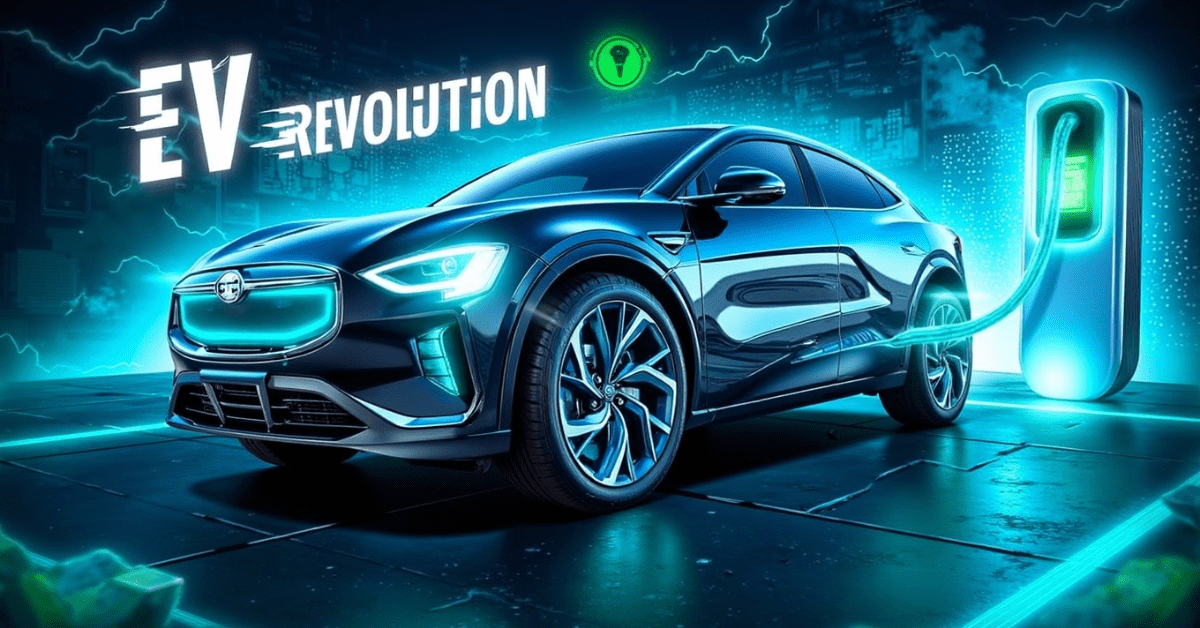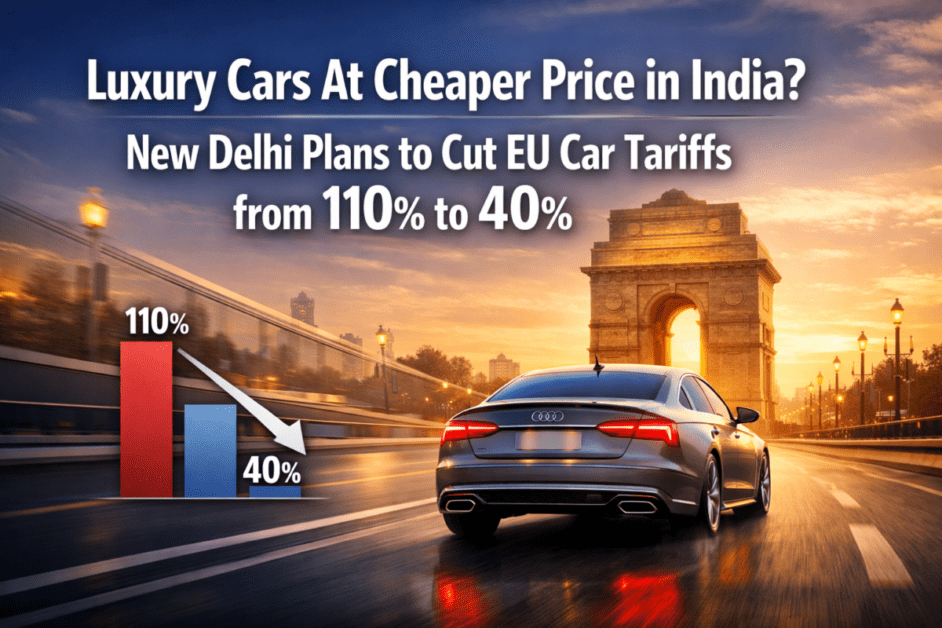Hey there, future car owner! Are you tired of soaring petrol prices? ⛽️ Worried about the environment? Or simply curious about the silent, smooth ride of an electric car? Well, you’ve come to the right place! India is quickly becoming a hub for electric vehicles (EVs), and the market is buzzing with exciting options. If you’re thinking about making the switch to an EV, especially looking ahead to 2025, it can feel a bit overwhelming with all the choices out there.
But don’t worry, I’m here to help you navigate this exciting world. I’ll share everything you need to know about the best EV cars in India, from affordable options to premium electric vehicles, and even a sneak peek at some upcoming electric models. My goal is to make sure you find the perfect electric car that suits your needs and budget, giving you all the details you need to make a smart choice. Let’s dive in and explore the fantastic range of EV cars available in our country!
Key Takeaways
- EV Adoption is Booming: India’s electric vehicle market is growing rapidly, with more choices and better infrastructure appearing every day, making 2025 an ideal time to consider an EV.
- Tata Motors Leads the Way: Tata is a dominant player in the Indian EV space, offering a wide range of affordable and popular EV models like the Nexon EV and Tiago EV.
- Variety for Every Budget: Whether you’re looking for an affordable city car like the MG Comet EV or a feature-packed SUV like the Hyundai Kona Electric, there’s an electric car for nearly every budget.
- Upcoming EVs Promise More Choices: Brands like Mahindra and Hyundai are set to launch exciting new electric cars, including SUVs, further expanding options for car buyers in India 2025.
- Consider Range, Charging, and Cost: When buying a electric car, think about its driving range, how and where you’ll charge it, and the total cost of ownership including the electric car price and potential savings.
Why Switch to an Electric Car in India? 🤔
You might be wondering, “Why should I even consider an electric car?” That’s a great question! For years, petrol and diesel cars have been the norm. But the world is changing, and electric vehicles (EVs) are quickly becoming a smart choice for many reasons, especially in India.
First off, let’s talk about fuel prices. We all know how unpredictable petrol prices can be. With an EV, you’re mostly charging at home, which can be significantly cheaper than filling up a tank of petrol. Imagine saying goodbye to those frequent trips to the fuel station! This is a huge factor for many car buyers, offering substantial long-term savings.
Then there’s the environment. EVs produce zero tailpipe emissions. This means less air pollution in our cities, leading to cleaner air for everyone. As someone who cares about the planet, I find this a very compelling reason to switch to electric mobility. It’s a small step that can make a big difference for future generations.
The driving experience of an EV is also something to rave about. They are incredibly quiet and smooth. No engine noise, no gear changes – just a seamless, powerful acceleration. It makes city driving, and even highway cruising, much more relaxing and enjoyable. Many user reviews highlight the superior driving experience.
“Switching to an EV isn’t just about saving money on fuel; it’s about embracing a quieter, cleaner, and smarter way to drive in India.”
Plus, the Indian government is actively promoting EV adoption with various incentives, subsidies, and efforts to build more charging station infrastructure. This makes buying a electric car even more attractive. Looking ahead to 2025, we can expect even more support and better facilities for EV owners.
So, if you’re looking for a modern, cost-effective, and eco-friendly way to travel, an electric car is definitely worth considering.
The Electric Car Market in India: A Quick Look 📊
The electric car market in India is growing at an incredible pace. Just a few years ago, there were only a handful of electric cars available, and they were often quite expensive electric cars. But now, it’s a completely different story! We’re seeing more and more options, from compact city cars to spacious electric SUVs.
Tata Motors has truly taken the lead in this segment. They’ve captured a huge share of the market with their popular EV models, making electric cars accessible to a wider range of people. Their strategy of offering reliable and value for money EVs has certainly paid off. You’ll find that many of the best electric cars in India come from the Tata stable.
Other major players like Mahindra and Hyundai are also heavily investing in EVs, bringing their own competitive models to the forefront. Even newer brands like MG have made a significant impact with their unique offerings. This competition is great for us, the consumers, as it means more choices, better technology, and competitive electric car prices.
As of now, you can find a list of best electric cars ranging from under 10 lakh to over 20 lakh, catering to different budgets and needs. The availability of charging station infrastructure is also improving, especially in major cities, which is crucial for the growth of electric mobility. India 2025 is poised to see even greater leaps in this sector.
Current Landscape of Electric Cars in India
- Dominant Players: Tata, MG, Hyundai, Mahindra.
- Price Range: From around 7.99 lakh for entry-level models to over 21.49 lakh for premium offerings.
- Body Types: Hatchbacks, compact SUVs, and full-size SUVs are all available.
- Charging Infrastructure: Rapidly expanding, especially in urban areas and along highways.
The future of electric cars in India looks bright, with continuous innovation and a strong push towards sustainable transportation.
Top Picks: Best EV Cars in India Right Now (and for 2025!) 🏆
Alright, let’s get to the exciting part – the cars themselves! When it comes to finding the best electric car in India, there’s no single answer, as it depends on your budget, needs, and preferences. But I’ve put together a list of the most popular electric cars that are making waves and are set to remain top contenders in 2025. These are the EVs that offer a great balance of range, features, performance, and value for money.
1. Tata Nexon EV Max & Prime
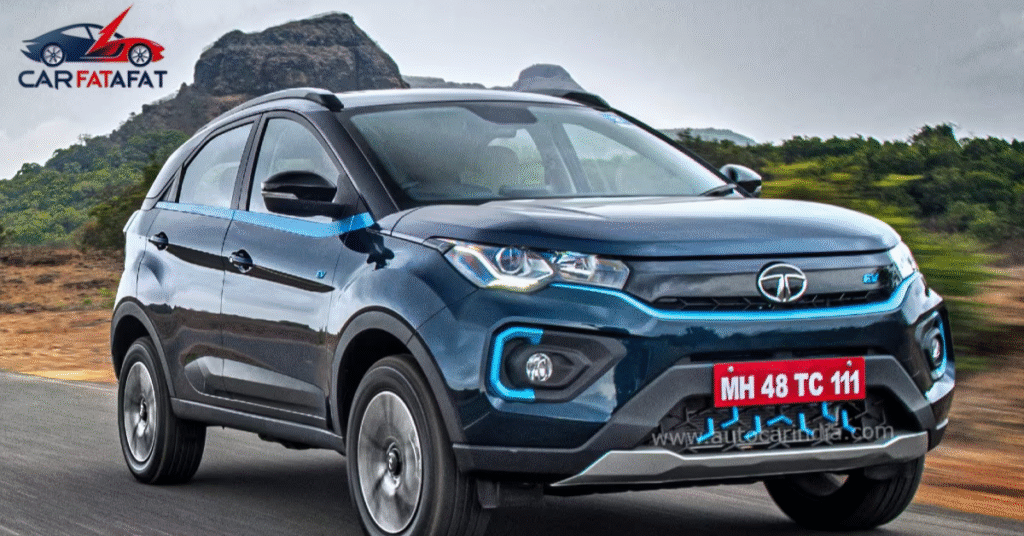
Let’s start with the undisputed king of Indian EVs: the Tata Nexon EV. This electric car has been a game-changer for Tata and for EV adoption in India. It comes in two main variants: the Nexon EV Prime and the Nexon EV Max.
The Nexon EV Prime is an excellent entry point into the world of electric vehicles. It offers a respectable driving range and is perfect for city commutes and occasional highway trips. Its compact SUV form factor makes it a very practical car in India, easy to drive in traffic and park.
The Nexon EV Max is for those who need more range and features. It comes with a larger battery pack, offering a significantly higher driving range, which gives you more peace of mind on longer journeys. It also packs in more premium features, making the driving experience even better. Both variants offer a smooth and silent ride, typical of an EV.
- Why it’s great: Proven reliability, widespread service network, good range options, and a popular SUV design. It’s often cited as India’s best-selling electric SUV.
- Price: The Tata Nexon EV price in India starts from around 14.49 lakh (ex-showroom price) for the Prime variant, going up to about 19.84 lakh (ex-showroom) for the Max variant. The road price will vary slightly.
- Mileage (Range): Nexon EV Prime offers an ARAI-certified range of about 312 km, while the Nexon EV Max boasts an ARAI-certified range of around 453 km. Real-world mileage will vary based on driving style and conditions.
- What I like: The solid build quality and the comfortable cabin. It truly feels like a complete package. For many, it’s the best car in its segment.
2. Tata Tiago EV ⚡
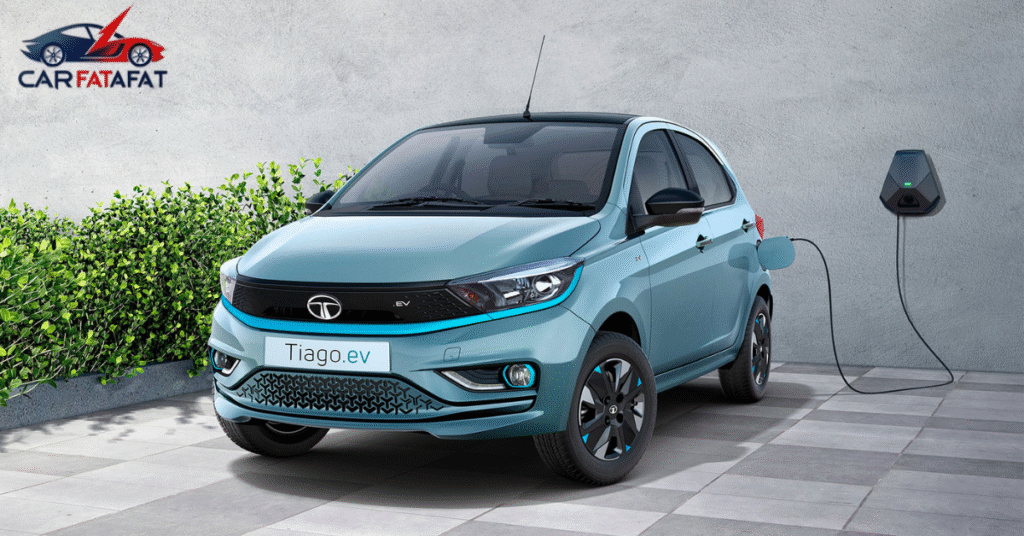
If you’re looking for the cheapest electric car or the lowest priced electric cars, the Tata Tiago EV is a fantastic option. This compact hatchback brings electric mobility within reach of many more car buyers. It’s a true value for money proposition from Tata Motors.
The Tata Tiago EV is designed primarily for city use. It’s nimble, easy to maneuver in tight spaces, and incredibly efficient for daily commutes. Despite its affordable price, it still offers a decent driving range for urban dwellers. It’s a great example of an EV at Rs that doesn’t compromise on the essential electric vehicle experience.
- Why it’s great: Super affordable, perfect for city driving, and makes owning an EV a reality for many. It’s a great first electric car for many families.
- Price: The Tata Tiago EV price in India starts from an incredible 7.99 lakh (ex-showroom price), making it one of the most accessible EVs on the market.
- Mileage (Range): It offers an ARAI-certified range of up to 315 km, which is more than sufficient for most city driving needs.
- What I like: Its compact size and ease of parking. It’s surprisingly spacious for a car of its segment, and the driving experience is very peppy.
3. MG Comet EV 🌟
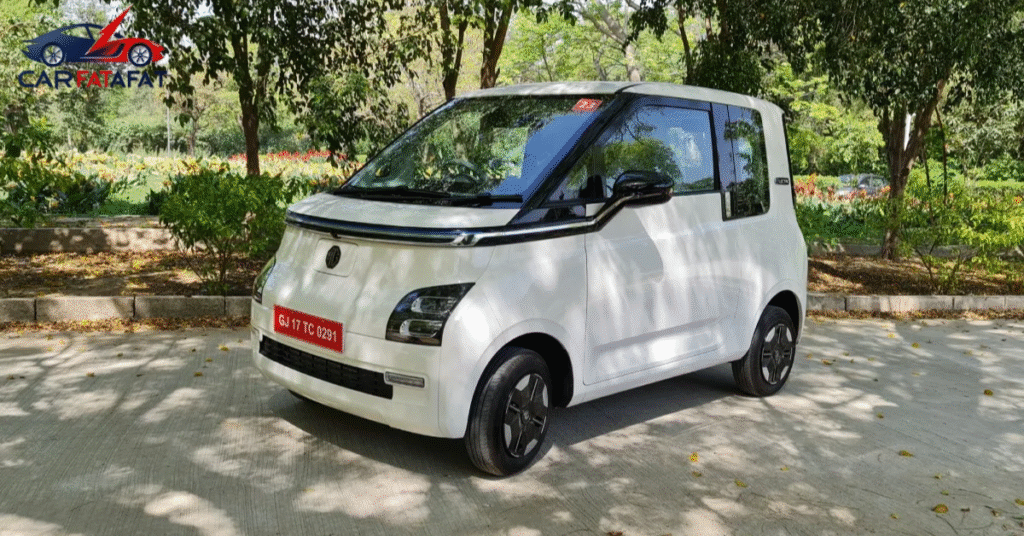
Here’s a unique entry into the EV space: the MG Comet EV. This isn’t just another electric car; it’s a statement! The Comet EV is an ultra-compact, two-door electric car designed specifically for urban mobility. It’s incredibly small, making it a breeze to navigate through congested city streets and find parking in the busiest areas.
Don’t let its size fool you; the MG Comet EV is packed with smart features, including a modern interior with dual screens. It’s meant for those who primarily drive alone or with one passenger and value convenience, ease of use, and a quirky design. It’s a fun and practical option for the urban jungle.
- Why it’s great: Extremely compact, easy to park, feature-rich for its size, and a head-turner. It stands out among other electric cars in India.
- Price: The MG Comet EV price starts from around 7.98 lakh (ex-showroom), making it another very affordable EV option.
- Mileage (Range): It offers a range of about 230 km on a single charge, which is plenty for daily city commutes.
- What I like: Its futuristic design and the surprisingly roomy interior for front passengers. It truly redefines what a city car can be.
4. Mahindra XUV400 EV
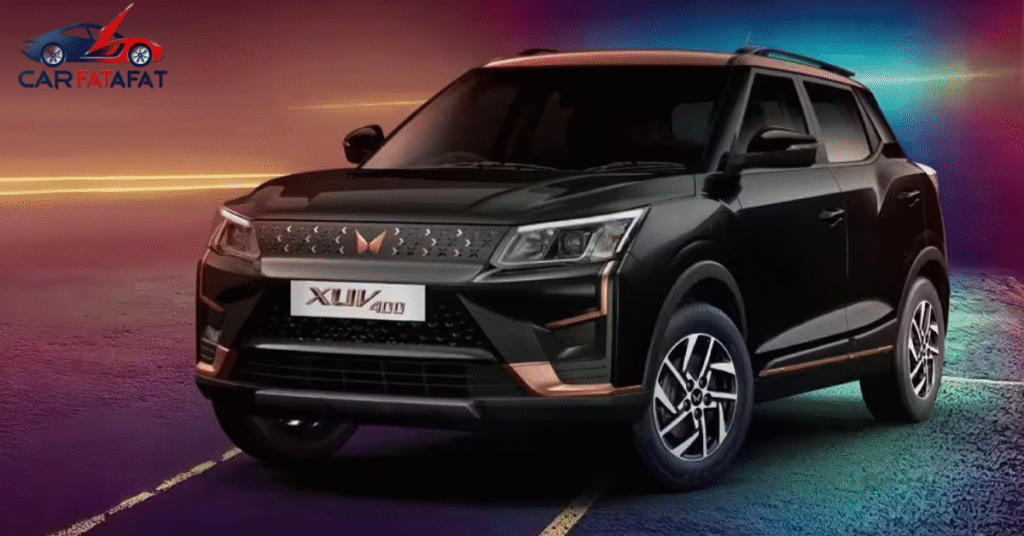
Mahindra has also jumped into the electric SUV segment with the Mahindra XUV400 EV. This electric SUV is a strong contender, especially if you’re looking for something with a bit more space and presence than the Nexon EV. It’s built on a proven platform and offers a good balance of performance and range.
The XUV400 EV comes with a powerful electric powertrain and a decent battery range, making it suitable for both city driving and longer weekend trips. Mahindra has focused on providing a comfortable ride and a spacious cabin, which is a big plus for families. User reviews often praise its robust build and comfortable seating.
- Why it’s great: Spacious interior, solid build, competitive range, and a strong alternative in the electric SUV segment.
- Price: The Mahindra XUV400 EV price starts from around 15.49 lakh (ex-showroom price).
- Mileage (Range): It offers an ARAI-certified range of up to 456 km, putting it in line with some of the best in class.
- What I like: Its comfortable ride quality and the sense of security it provides on the road. It feels like a proper SUV.
5. Hyundai Kona Electric
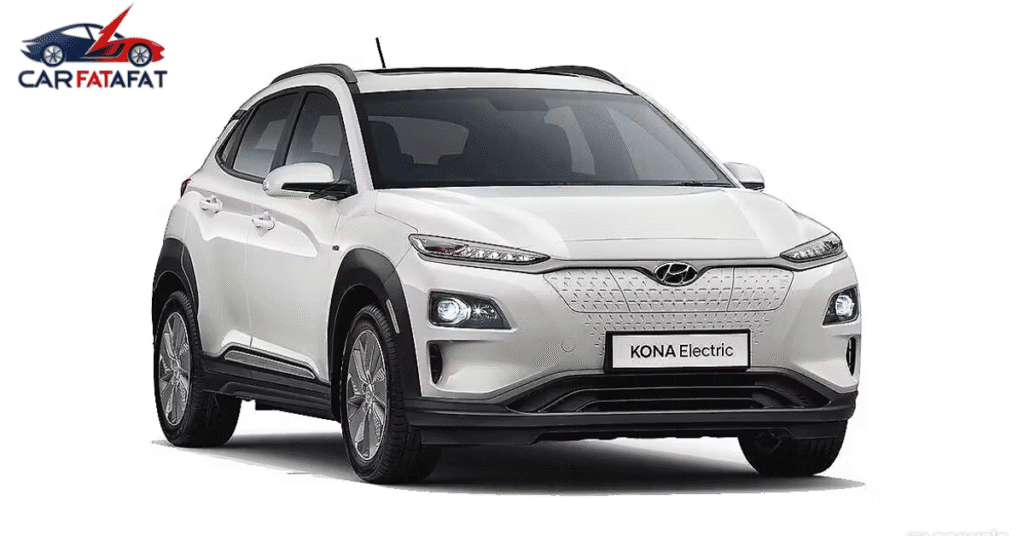
For those looking for a more premium electric car experience without breaking the bank for very expensive electric cars, the Hyundai Kona Electric is an excellent choice. Hyundai was one of the first mainstream manufacturers to launch a long-range EV in India, and the Kona Electric has proven to be a reliable and efficient electric car.
The Kona Electric offers a good mix of performance, features, and an impressive driving range. It’s a compact SUV that feels agile and refined. Hyundai’s reputation for quality and service also adds to its appeal. While its ex-showroom price is higher than the Tata and Mahindra EVs, it offers a more globally refined electric vehicle experience.
- Why it’s great: Proven global platform, good performance, impressive range, and a premium feel.
- Price: The Hyundai Kona Electric price starts from around 23.84 lakh (ex-showroom price).
- Mileage (Range): It offers an ARAI-certified range of 452 km, making it suitable for long distances.
- What I like: The brisk acceleration and the comprehensive feature list. It truly feels like a modern electric car.
6. Tata Punch EV
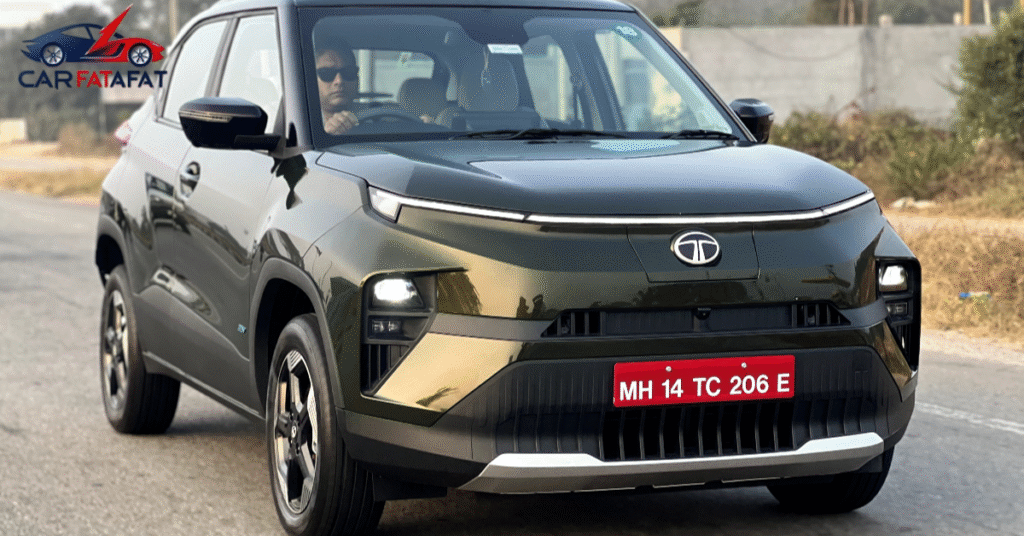
The Tata Punch EV is another exciting addition to Tata’s electric lineup, filling the gap between the Tiago EV and Nexon EV. This electric car is a micro-SUV, offering the rugged appeal of an SUV in a more compact and affordable package. It’s designed to appeal to those who want the best of both worlds – the practicality of a hatchback with the stance of an SUV.
The Punch EV comes with Tata’s Ziptron powertrain, ensuring reliable performance and a good range for its segment. It’s quickly becoming one of the popular electric cars in India due to its appealing design and competitive pricing. It’s another example of Tata making electric cars accessible to more car buyers.
- Why it’s great: SUV styling in a compact size, good range for city and highway, and a strong value for money proposition.
- Price: The Tata Punch EV price starts from about 10.99 lakh (ex-showroom price).
- Mileage (Range): It offers an ARAI-certified range of up to 421 km (Long Range variant).
- What I like: Its robust looks and the comfortable high seating position, which is great for Indian roads.
Here’s a quick comparison table of these popular electric cars:
| Car Model | Starting Ex-Showroom Price (Approx. ₹ Lakh) | ARAI Range (Approx. km) | Body Type | Key Highlight |
|---|---|---|---|---|
| Tata Nexon EV Prime | 14.49 | 312 | Compact SUV | Bestselling EV, reliable city performer |
| Tata Nexon EV Max | 18.00 | 453 | Compact SUV | Longest range in its segment, feature-rich |
| Tata Tiago EV | 7.99 | 315 | Hatchback | Most affordable EV, great for city commutes |
| MG Comet EV | 7.98 | 230 | Ultra-Compact | Unique urban mobility solution, easy to park |
| Mahindra XUV400 EV | 15.49 | 456 | Compact SUV | Spacious cabin, powerful electric powertrain |
| Hyundai Kona Electric | 23.84 | 452 | Compact SUV | Premium feel, proven global EV |
| Tata Punch EV | 10.99 | 421 | Micro-SUV | SUV looks, compact size, great value |
Prices are ex-showroom and subject to change. Range figures are ARAI certified and real-world range may vary.
Upcoming Electric Cars in India (2025 and Beyond) 🚀
The EV landscape in India is constantly evolving, and 2025 promises to be an exciting year with several new electric cars set to hit the market. These upcoming electric models will offer even more choices, pushing the boundaries of technology, design, and affordability. Here’s a glimpse of what’s coming:
1. Tata Curvv EV 🤩
Tata is not resting on its laurels. The Tata Curvv EV is one of the most anticipated upcoming electric cars from the brand. It’s expected to be an electric SUV with a coupe-like design, offering a stylish and modern look. Positioned above the Nexon EV, it will likely offer more space, premium features, and a longer driving range. This could be a game-changer for Tata in the mid-size electric SUV segment. I’m personally very excited about this one!
2. Tata Harrier EV
Following the success of its current EV lineup, Tata is also expected to launch the Tata Harrier EV. This electric SUV will be based on the popular Harrier platform, known for its strong road presence and spacious interior. The Harrier EV is likely to be a more premium and capable electric SUV, offering a substantial battery range and advanced features. It will be a strong contender in the higher end of the mainstream EV market.
3. Hyundai Creta Electric (Hyundai’s Next Big EV)
Hyundai is set to electrify its best-selling SUV, the Creta, with the Hyundai Creta Electric. This is a huge deal because the Creta is already one of the most popular cars in India. An electric version will bring the familiar comfort and features of the Creta, combined with the benefits of an EV. We can expect a good driving range and Hyundai’s signature tech-laden interior. This will definitely shake up the electric SUV segment in 2025.
4. Mahindra BE.05 / BE.06 / BE.07 (and Mahindra XUV.e series)
Mahindra is making a big push into the EV space with its new ‘Born Electric’ (BE) platform. We’re expecting several new electric SUVs from Mahindra, including the Mahindra BE 6 and Mahindra XEV 9e. These EVs are designed from the ground up to be electric, promising cutting-edge technology, impressive range, and futuristic designs. Mahindra is clearly aiming to be a major player in the electric SUV market, offering a range of models to compete with the likes of Tata and Hyundai. These will likely be some of the most advanced electric vehicles from an Indian manufacturer.
“The surge of upcoming electric models, especially from Indian giants like Tata and Mahindra, signals a vibrant and competitive EV future for India 2025.”
5. Maruti Suzuki eVX (and other Maruti EVs)
While not on the explicit keyword list, it’s worth mentioning that Maruti Suzuki, India’s largest carmaker, is also working on its first electric SUV, the eVX, expected by 2025. This will be a significant entry, as Maruti’s wide network and mass-market appeal could further accelerate EV adoption in India.
The market for electric cars in India is only going to get bigger and better, offering more choices for every budget and need. It’s a great time to be a car buyer considering the switch to electric!
Things to Consider When Buying an EV Car in India 🧐
Buying a electric car is a bit different from buying a petrol or diesel car. There are a few unique things you should keep in mind to make sure you find a good car which suits your lifestyle. I want to help you make an informed decision, so here are some important points:
1. Driving Range (Mileage) 🛣️
This is probably the first thing people ask about an EV. How far can it go on a single charge? The “mileage” or driving range of an EV is crucial, especially in India where charging infrastructure is still developing.
- ARAI Certified vs. Real-World Range: Car manufacturers provide an ARAI (Automotive Research Association of India) certified range. This is usually tested under ideal conditions. In the real world, factors like driving style, traffic, AC usage, and weather can affect the actual range. It’s often about 70-80% of the ARAI figure.
- Your Daily Needs: Think about your average daily commute. Do you drive 50 km or 200 km? For city driving, even a range of 200-250 km might be enough. For frequent highway trips, you’ll want something with 350 km+ of real-world range. The range of Tata Nexon EV Max, for example, is quite impressive for longer trips.
2. Charging Options and Infrastructure 🔌
This is perhaps the biggest shift for new EV owners.
- Home Charging: This will be your primary charging station. Most EVs come with a portable charger (for regular wall sockets) and often a faster AC charger (like a 7.2 kW unit) that needs to be installed at your home or workplace. This is the most convenient and cheapest way to charge your EV.
- Public Charging Stations: The number of public charging station points is growing rapidly, especially in cities and along major highways. You’ll find fast DC chargers (which can charge your car much quicker) and slower AC chargers. Apps like Tata Power EZ Charge, ChargeGrid, and others help you locate nearby charging points.
- Charging Time: Fast chargers can get your battery from 10% to 80% in about an hour, while home AC chargers might take 6-10 hours for a full charge. Plan your charging routine based on your daily driving.
3. Electric Car Price and Running Costs 💰
The upfront electric car price can be higher than a similar petrol car. However, consider the total cost of ownership.
- Ex-showroom Price vs. On-Road Price: Remember, the ex-showroom price is just the base price. You’ll also pay for registration, insurance, road tax, and other charges to get the final road price.
- Running Costs: This is where EVs shine!
- Fuel Savings: Electricity is much cheaper per kilometer than petrol. You can save a lot on fuel prices.
- Lower Maintenance: EVs have fewer moving parts than petrol cars, meaning less wear and tear and lower maintenance costs. No engine oil changes, no spark plugs, etc.
- Government Incentives: Check for state and central government subsidies, tax benefits (like lower road tax), and other incentives on buying a electric car. These can significantly reduce the effective ev price.
- Resale Value: While the EV market is still young, popular electric cars like the Tata Nexon EV are showing good resale value.
4. Battery Warranty and Lifespan 🔋
The battery is the most expensive component of an EV.
- Warranty: Most manufacturers offer a long warranty on the battery pack, typically 8 years or 160,000 km, whichever comes first. This gives you peace of mind.
- Lifespan: EV batteries are designed to last for many years, often beyond the warranty period. Even after years of use, they retain a significant portion of their original capacity.
5. Features and Technology 📱
Modern EVs are packed with advanced tech.
- Connectivity: Many EVs come with connected car tech, allowing you to monitor charging, pre-cool the cabin, and even track your car via a smartphone app.
- Safety: EVs often have a lower center of gravity due to the battery placement, which can improve stability. Look for models with good safety ratings and features like multiple airbags, ABS, and ESP.
- Driving Modes: Most EVs offer different driving modes (Eco, City, Sport) that adjust power output and regeneration to optimize range or performance.
6. User Reviews and Expert Reviews ⭐
Before making a decision, it’s always a good idea to check out reviews of electric cars.
- User Reviews: Read what actual owners are saying about their driving experience, charging routines, and overall satisfaction. Websites like CarWale often have detailed user reviews.
- Expert Reviews: Watch or read professional reviews from automotive journalists. They often provide in-depth analysis of the car’s performance, features, and practicality.
By considering these factors, you’ll be well-equipped to find the best car which suits your needs and confidently switch to electric!
EV Cost Calculator: Petrol vs. Electric Savings 💰
Thinking about the running cost difference between a petrol car and an EV? Use this simple calculator to get an idea of how much you could save on fuel!
EV vs. Petrol Running Cost Savings Calculator 🤑
Enter values and click ‘Calculate’ to see your potential savings!
*This is an estimate. Actual savings may vary based on driving conditions, car model, and electricity tariffs. Charging at public fast chargers can be more expensive.
The Future of EV Cars in India 🌍
The journey of electric cars in India has just begun, and the future looks incredibly promising. We’re not just talking about a few models here and there; we’re talking about a complete transformation of the automotive industry.
Increased EV Adoption: As charging infrastructure improves and battery technology advances, we’ll see even faster EV adoption across the country. Government initiatives, coupled with growing environmental awareness, will continue to drive this change. The goal for India 2025 and beyond is to significantly increase the number of electric vehicles on our roads.
More Choices, Better Tech: Expect to see 49 electric cars or even more models from various manufacturers, including new entrants. This means more options for different budgets and preferences, from compact city cars to robust electric SUVs. Battery range will likely increase, and charging times will decrease, making EVs even more convenient. We might even see more affordable hybrid options initially, like the Kia Seltos Hybrid or upcoming hybrid SUVs in India, before a full switch to electric.
Advanced Charging Solutions: Imagine faster charging stations everywhere – at malls, workplaces, and even residential complexes. Wireless charging and battery swapping technologies might also become more common, revolutionizing how we “fuel” our cars.
Local Manufacturing: Indian manufacturers like Tata and Mahindra are investing heavily in localizing EV production, which will help bring down costs and make electric cars even more affordable for the average Indian buyer. This focus on “Make in India” for EVs is a big boost.
Sustainability Beyond the Car: The focus won’t just be on the car itself, but on the entire ecosystem – from renewable energy sources for charging to responsible battery recycling. Electric mobility is about a holistic approach to a greener future.
It’s clear that electric cars are here to stay, and they’re set to redefine personal transportation in India. As someone who’s been following this space closely, I can tell you that the next few years are going to be incredibly exciting for car buyers!
Frequently Asked Questions About EVs in India 🤔
I know you might have a few more questions swirling in your mind. Here are some of the most common ones I hear:
Q1: What is the cheapest electric car in India?
The cheapest electric car currently available in India is the MG Comet EV, with a starting ex-showroom price of around ₹ 7.98 lakh. Close behind is the Tata Tiago EV, starting from ₹ 7.99 lakh. Both offer excellent value for money for those looking for lowest priced electric cars, especially for city use.
Q2: Which EV has the highest mileage (range) in India?
Several EVs offer impressive range. Among the popular electric cars, models like the Mahindra XUV400 EV (ARAI certified 456 km) and Tata Nexon EV Max (ARAI certified 453 km) provide excellent driving range. For more premium options, the Hyundai Kona Electric also offers a range of 452 km. Remember, real-world range will vary.
Q3: Is it worth buying an EV in India in 2025?
Absolutely! With improving charging infrastructure, a wider variety of models (including many new electric cars expected in 2025), lower running costs, and government incentives, 2025 is an excellent time to consider buying a electric car. The savings on fuel prices alone can be substantial over time, making it a smart financial choice in the long run, especially compared to petrol and diesel vehicles.
Q4: How long does it take to charge an EV?
Charging time depends on the car’s battery size and the type of charger.
- Slow AC Charger (3.3 kW, typical home socket): Can take 10-15 hours for a full charge.
- Standard AC Charger (7.2 kW, dedicated home charger): Usually charges from 0-100% in 6-8 hours.
- DC Fast Charger (25 kW to 100+ kW, public stations): Can charge from 10-80% in 50-90 minutes, depending on the car and charger power.
Q5: Are EVs safe in India?
Yes, modern EVs are designed with high safety standards, often similar to or exceeding their petrol counterparts. The battery pack is typically placed in the floor, which lowers the center of gravity and can improve stability. Many popular electric cars, like the Tata Nexon EV, have received high safety ratings (e.g., 5-star GNCAP rating for the petrol Nexon, which shares its platform). Manufacturers like Tata, Hyundai, and Mahindra prioritize safety in their electric vehicle designs.
Q6: What about battery replacement cost?
EV batteries are designed to last for a very long time, typically 8-10 years or more, and come with long warranties (e.g., 8 years/160,000 km). Battery degradation is usually slow. While replacement is expensive (can be several lakh), it’s generally not expected within the useful life of the car for most users.
Q7: Can I take an EV on long road trips in India?
Yes, you can! With the increasing number of public charging stations along highways, especially with models like the Tata Nexon EV Max or Mahindra XUV400 EV that offer good battery range, long road trips are becoming much more feasible. Planning your stops around charging stations is key. You can check apps like CarWale for charging station maps.
Q8: What are the benefits of switching to electric?
The benefits are numerous:
- Lower running costs: Significantly cheaper “fuel” (electricity) compared to petrol.
- Environmental benefits: Zero tailpipe emissions, contributing to cleaner air.
- Quieter and smoother driving experience: No engine noise or vibrations.
- Government incentives: Subsidies, tax benefits, and lower road tax in many states.
- Reduced maintenance: Fewer moving parts mean less wear and tear.
- Future-proof: EVs are the future of mobility, making them a smart long-term investment.
I hope these answers help clear up some of your doubts! The world of EVs is exciting, and with proper research, buying a electric car can be a truly rewarding experience.
Final Thoughts: Your Journey to Electric Mobility 💚
Phew, we’ve covered a lot, haven’t we? From the current best EV cars in India like the popular Tata Nexon EV and the super-affordable Tata Tiago EV, to exciting upcoming electric models from Mahindra and Hyundai, it’s clear that the Indian EV market is booming. Whether you’re looking for a compact city car like the MG Comet EV or a spacious electric SUV, there’s a perfect electric car out there for you.
Remember, making the switch to electric isn’t just about getting a new car; it’s about embracing a new lifestyle. It’s about saying goodbye to fluctuating fuel prices, enjoying a quieter driving experience, and contributing to a cleaner environment. The electric car price might seem like a big investment upfront, but the long-term savings on running costs and the joy of driving an advanced electric vehicle make it a truly value for money proposition.
As we look towards 2025, the future of electric mobility in India looks brighter than ever. More choices, better charging infrastructure, and continuous technological advancements mean that now is a fantastic time to consider your first electric car.
So, are you ready to join the electric revolution? I certainly am, and I believe you will love the change! Happy driving, and see you on the electric roads of India! ⚡🇮🇳
